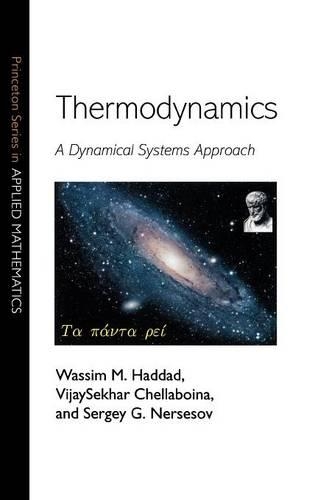
Thermodynamics: A Dynamical Systems Approach
(Hardback)
Publishing Details
Thermodynamics: A Dynamical Systems Approach
By (Author) Wassim M. Haddad
By (author) VijaySekhar Chellaboina
By (author) Sergey G. Nersesov
Princeton University Press
Princeton University Press
4th October 2005
United States
Classifications
Professional and Scholarly
Non Fiction
541.369
Winner of American Institute of Aeronautics and Astronautics Gardner-Lasser Aerospace History Literature Award 2014
Physical Properties
Hardback
200
Width 152mm, Height 235mm
454g
Description
This book places thermodynamics on a system-theoretic foundation so as to harmonize it with classical mechanics. Using the highest standards of exposition and rigor, the authors develop a novel formulation of thermodynamics that can be viewed as a moderate-sized system theory as compared to statistical thermodynamics. This middle-ground theory involves deterministic large-scale dynamical system models that bridge the gap between classical and statistical thermodynamics. The authors' theory is motivated by the fact that a discipline as cardinal as thermodynamics--entrusted with some of the most perplexing secrets of our universe--demands far more than physical mathematics as its underpinning. Even though many great physicists, such as Archimedes, Newton, and Lagrange, have humbled us with their mathematically seamless eurekas over the centuries, this book suggests that a great many physicists and engineers who have developed the theory of thermodynamics seem to have forgotten that mathematics, when used rigorously, is the irrefutable pathway to truth. This book uses system theoretic ideas to bring coherence, clarity, and precision to an extremely important and poorly understood classical area of science.
Reviews
"The mathematical approach taken by the authors, as originally initiated by C. Caratheodory on the advice of Max Born, results in a book that makes a fundamental contribution to the field. The main emphasis is on the notion of large-scale dynamical systems applied to the multitude of small objects contained in the macroscale description. Indeed, thermodynamics is the dynamics of an extremely large number of objects numbering on the order of Avogadro's number. That some definite results arise from that setting is the marvel of it all."--Gerard A. Maugin, IEEE Control Systems "This is an original theory with many attractive features and which captures the known statements from classical thermodynamics, avoiding at the same time imprecise formulations. The techniques are based on dynamical systems and control theory, which is unusual in the field, but the presentation is precise and well crafted."--Manuel Portilheiro, Mathematical Reviews
Author Bio
Wassim M. Haddad is Professor of Aerospace Engineering at the Georgia Institute of Technology. VijaySekhar Chellaboina is Associate Professor in the Department of Mechanical, Aerospace, and Biomedical Engineering at the University of Tennessee, Knoxville. Sergey G. Nersesov is a Ph.D. student in aerospace engineering at Georgia Institute of Technology.
